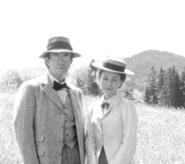For those who don't have the history of the Austro-Hungarian Empire at their fingertips, Alma (Sarah Wynter) was an outspoken party girl from a well-heeled family who, at the dawn of the 20th century, seduced many of the most creative men in Vienna, which was then a capital of European artistic ferment. In the course of her adventures, she married modernist composer Gustav Mahler, betrayed him for Bauhaus architect Walter Gropius, retraced her steps to the dying Mahler, then took up with expressionist painter Oskar Kokoschka. Not one to slight the literary arts, she at last married and moved to (where else?) Hollywood with poet and novelist Franz Werfel, author of The Song of Bernadette. All told, Schindler's list of conquests comprised dozens -- including painter Gustav Klimt, composer Alexander Zamlinsky, and for all we know, Sigmund Freud, selected Hapsburg princes and the waiters who delivered her linzer torts at the corner café. She was said to be a dazzling beauty (former cover girl Wynter fits that bill), and while most previous accounts acknowledge her as a muse to the great, they also portray her as a reckless femme fatale, a kind of pioneer culture groupie who jumped out of her ball gown every time some budding genius waving a paintbrush or a baton whispered "avant garde" in her ear.
The present filmmakers mean to change all that. Director Beresford, a hit-and-miss type whose best work includes Driving Miss Daisy and Tender Mercies, tries very hard in Wind to mythologize the woman remembered as Alma Mahler. Clearly, he and screenwriter Marilyn Levy want audiences to see her as a proto-feminist, a dedicated nurturer who was also an outspoken revolutionary who refused to let her own ambitions as a composer and pianist be thwarted by the jealous, controlling men in her life. Beresford and Levy try to create a passionate woman-force struggling for personal freedom almost a century before it became fashionable.
That's a good idea, if not very original. But the actual movie is a mess.
For one thing, leading lady Wynter may look great on the front of Vanity Fair or Vogue, but when it comes to portraying a fiercely intelligent rebel, she's obviously in over her head, and Levy's idiotic dialogue doesn't help. Alma's early stands against convention -- talking back to her imperious stepfather, challenging Mahler's ego at a dinner party -- don't bespeak vision but shallow brattiness. "Music is my whole life," the beautiful but empty Wynter proclaims. We have no good reason to believe her. Meanwhile, the unfortunate Germanic accent Wynter's installed for the occasion comes and goes. A little later, when Alma starts dashing from man to man, her choices seem random rather than heartfelt, largely because the film defines the men even less deftly than it defines Alma. This ostensibly talented cast tries its best, but Jonathan Pryce's Mahler is a sketch of bad temper, and Simon Verhoeven's Gropius is reduced to a fleck of professional manifesto: "We must be more functional!" Werfel (Gregor Seberg) apparently captures Alma's heart by sitting on a piano bench and bellowing: "I prefer passion! Love! Ecstasy!"
Moviegoers might have preferred a little more care with the characters. As it is, Alma comes off not as a courageous trailblazer, but as an indiscriminate adventuress afflicted with a short attention span -- the same picture the gossipmongers of her own day painted. Beresford's style is characteristically plodding and flatfooted, but at the same time love affairs and world events fly by so fast in the course of these 99 minutes that we never get a chance to understand them. In this scheme of things, World War I and the Russian Revolution are minor inconveniences that briefly interrupt poor, dumb Alma's romantic intrigues. She explains the former this way: "War brings out the worst in men -- also the best." She dismisses the latter with a wave of the hand: "Horrible people, socialists!" Wynter's flyweight screen presence renders such lines even more ridiculous than they are on the page. When painter Kokoschka (Vincent Perez), distraught because Alma has abandoned him, stumbles into a friend's dining room with a painted scarecrow effigy of her as his date, an uncharitable thought springs to mind: This new Alma is just as convincing as the one we've been watching for an hour. Beresford and Levy have changed Alma Mahler's image, all right: They've replaced the promiscuous harpy with a halfwit.
But the movie's very best line -- which is to say, the most hilarious miscalculation -- belongs to a minor character. The shabby, ancient mother of Kokoschka (whose disturbed painting of Alma and himself, Bride of the Wind, provides the film's title) shows up at Alma's door, infuriated that this brazen redhead has jilted her war-hero son. Alma's own mother spots the old lady and sniffily asks: "Are you seeking employment?" "No," Mrs. K. replies. "Revenge!"
Nonetheless, Wind staggers on with its besmirched heroine intact, toward a phony-triumphant ending in which Alma's second-rate music is finally performed in a concert, while she beams in the front row of the hall. Her only accomplishment, she has earlier lamented, is her long list of lovers. Judging by this ill-conceived soap opera, we have no reason to dispute her.










